
This strategy can also be downloaded as a PDF
Contents
- Background
- Acronyms
- Definitions
- Introduction
- Vision and Statement of Commitment
- Work Package 4: Involvement and Inclusion
- Working in Partnership
- Governance and Lines of Reporting
- Our Goals
- Embedding EDI in UKCRF Network Work Programme
- Supporting the UKCRF Network Workforce
- UKCRF Network EDI SMART Objectives 2023-2028
- Monitoring Outcomes
- Acknowledgements
- Contacts
Background
We are committed to Equality, Diversity, and Inclusion (EDI) across the UKCRF Network. We know that diverse people and communities shape and improve our research. This Equality, Diversity, and Inclusion Strategy (2023) will highlight our ambition and responsibilities to develop and strengthen EDI culture across the whole of the UKCRF Network.
Acronyms
We have tried to minimise acronyms in this strategy. The ones we have used can be found below:
- CRF: Clinical Research Facility
- EDI: Equality, diversity, and Inclusion
- NIHR: National Institute for Health and Care Research
- PPIE: Patient and Public Involvement and Engagement
- SLT: Senior Leadership Team
- SMT: Senior Management Team
- UKCRF Network: United Kingdom Clinical Research Facility Network
- WP: Work Package
Definitions
Clinical Research Facility: purpose-built facilities in NHS hospitals where researchers can undertake studies for patient benefit in a controlled environment. These studies may be observational, or early on in a drug development pathway, sometimes referred to as early phase trials.
Collaboration: to work with someone else to produce something.
Cross cutting: linking projects across the separate Network Work Packages and working together.
Equality: ensuring that everyone is given equal access to resources and opportunities to use their skills and talents.
Equity: trying to understand and give people what they need to achieve their potential; some individuals or groups may need additional help or resources to achieve their goals.
Experimental medicine: research undertaken in people to better understand the cause of disease and/or test new treatments, also known as early phase clinical research.
Diversity: being reflective of the wider community. Having a diverse community, with people from a broad range of backgrounds represented in all areas and at all levels.
Inclusion: an approach where groups or individuals with different backgrounds are welcomed, culturally and socially accepted, and treated equally. Engaging with each person as an individual. A sense of belonging that is respectful of people for who they are.
Intersectionality: a framework that acknowledges that all people have unique experiences of discrimination and disadvantage exacerbated by the overlap of multiple social identities.
Outward facing: work that is related to people and their experiences and how we can work together with the other Work Packages and their work.
Proportionate: CRFs differ in size, budget, speciality, experience, expertise and workforce. This means that we can provide resources and support equitably and relevant to individual CRF needs.
Public members: include patients, potential patients, carers, and people who use health and social care services as well as people from organisations that represent people who use services.
Research: discovering new knowledge that could lead to changes in treatments, policies, or care.
Stakeholder: a person or people such as an employee or customer who is involved with an organisation and has responsibilities towards it and an interest in its success.
Introduction to the UKCRF Network
The UK Clinical Research Facility Network brings together CRFs from UK and Ireland to lead, develop and coordinate ‘best practice’ in research delivery to benefit patients and the public. Clinical Research Facilities provide dedicated purpose built, flexible clinical research spaces with highly skilled, agile, and experienced workforce, usually located on NHS hospital sites, see figure 1.
Figure 1: map of all CRFs across UK and Ireland
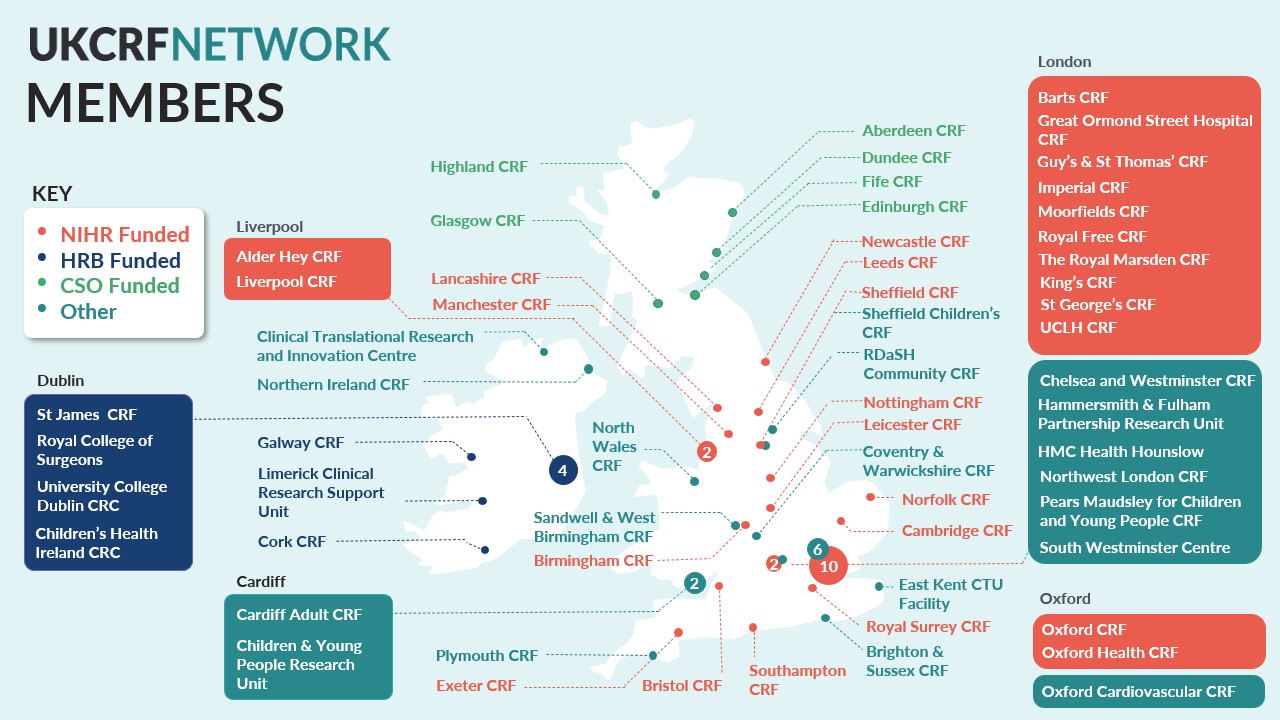
UKCRF Network e-Brochure (link)
The UKCRF Network is funded by an NIHR Award to deliver operational excellence in four domains known as Work Packages (WP):
- Work Package 1: Operational Delivery
- Work Package 2: Strategic Leadership
- Work Package 3: Workforce Development
- Work Package 4: Involvement and Inclusion
Each Work Package comprises Work Groups which deliver the strategic and operational objectives of the Network.
Figure 2: UKCRF Network Work Groups
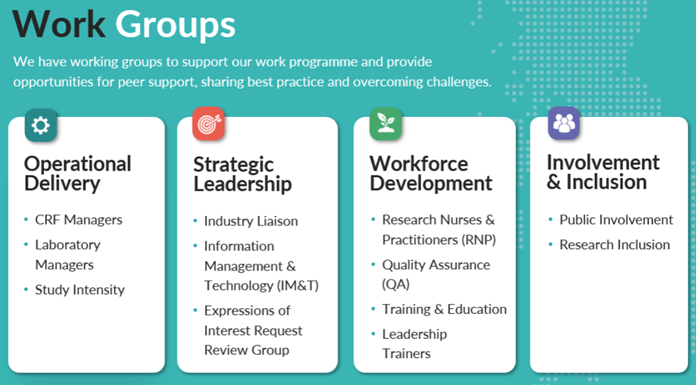
Work Package 4: Involvement and Inclusion
WP4 comprises two Work Groups, Involvement (Public and Patient Involvement, Engagement, and Participation, PPIE); and Inclusion (Equality, Diversity and Inclusion, EDI). Whilst these overlap, we have separate strategies for Involvement and Inclusion (EDI), with dedicated leadership and separate Work Groups. A key priority is to work across all Work Packages.
Statement of Commitment and Vision
Our vision is to develop and strengthen equality, diversity, and inclusion culture across the UKCRF Network
We will align with NIHR EDI Strategy for 2022-2027, embedding EDI within CRF infrastructure and supporting people from diverse backgrounds into research by providing appropriate training, resources, guidance and opportunity.
We are committed to:
- Supporting CRFs, which differ in size, scope, funding, location, specialities and workforce, to deliver equitable, inclusive, and diverse research that reduces health inequalities.
- Increasing diversity of UKCRF Network members within its leadership structure, members, research and CRF EDI Champions.
- Sustaining an inclusive research environment where everyone can contribute whether a patient, member of the public or part of the research workforce.
- Working collaboratively with stakeholders, partners and collaborators to identify EDI priorities drawing on collective evidence to ensure long term success.
We expect to face challenges. Equality, diversity and inclusion can be uncomfortable, especially when addressing topics such as structural barriers like background or race.
Governance and Lines of Reporting
The UK CRF Network governance structure, figure 3 below, shows accountability, and lines of reporting for all Work Packages through an internal Senior Management Team (SMT) and Senior Leadership Team through to an external Strategic Advisory Board, which includes public members. WP4 Inclusion Lead will provide quarterly updates to SMT and will contribute to writing the NIHR Annual Report. WP4 Work Group will comply with agreed Terms of Reference, that determine membership, meetings, and monitoring. Governance arrangements are outlined in figure 3.
Figure 3: UKCRF Network Governance Structure
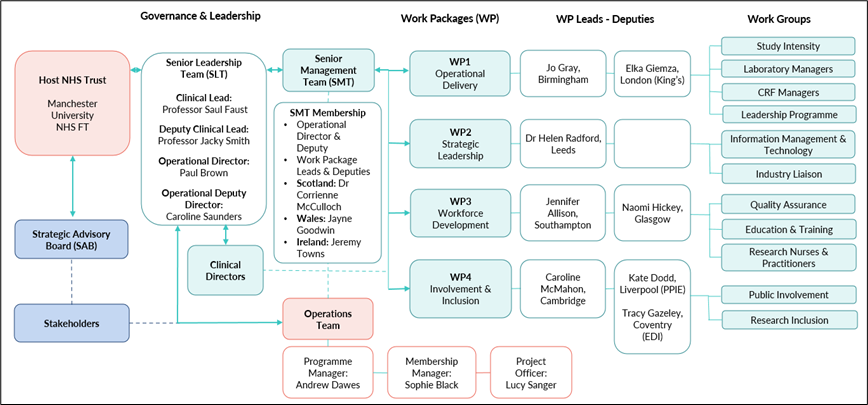
Working Collaboratively
Working with CRF EDI Leads, our Inclusion Work Group members and our public contributors, we will work collaboratively to provide:
- Peer support for CRF EDI staff and public contributors
- EDI Workforce development opportunities for CRF staff and public contributors
- Collaboration opportunities for CRF staff and public contributors
- Opportunities to share real life experiences
- Opportunities to work with external stakeholders e.g. NIHR, Devolved Nations & Ireland, and other NIHR infrastructure
- Opportunities for working with other UKCRF Network Work Packages and Work Groups on cross cutting projects:
- WP1 Barriers to research participation
- WP2: Marketing Materials
- WP3: Workforce Development
Our Goals and SMART Objectives
We have three key goals:
- Embed EDI across the UKCRF Network
- Build capacity, capability, and confidence in CRF EDI Leads
- Identify and address barriers to research participation
1) Embed EDI across the UKCRF Network
The UKCRF Network has a strong and established Senior Leadership Team, their commitment to EDI is demonstrated in the vision for 2023-2028 UKCRF Network, changing the organisational structure by embedding EDI as its own Research Inclusion Work Group as part of WP 4.
WP4: Involvement and Inclusion (Public Involvement and Research Inclusion) resources include funding for a WP Lead, WP Deputy Lead for Inclusion, Group Chair, and Link Director (see figure 3). These roles will support the wider UKCRF Network, including other Work Packages, to embed EDI in their governance and operations. This step change in the UKCRF Network and our objectives reflect that EDI is cross cutting across all UKCRF Network Work Packages to increase and embed EDI across all Work Packages.
EDI Work Package ambitions:
- WP1: Operational Delivery: To increase diversity of its members, both within its leadership structure and membership, including meeting Workforce Race-Equality Standards and embedding results from the Race-Equality Framework pilot.
- WP2: Strategic Leadership: Work with stakeholder groups (patients/industry/charities/NIHR infrastructure) to deliver a nationally integrated EDI-focused early phase research delivery platform for adults and children.
- WP3: Workforce Development: Support our workforce by creating shared learning opportunities and provide peer support, promote working in CRFs and expand career pathways and retain talent.
- WP4: Involvement and Inclusion: Provide Peer support, sharing best practice, and providing training and development across the UKCRF Network.
Our success will be measured by:
- Appointing Leads to Work Package 4, complying with best practice of both Host Trust and NIHR for EDI and to deliver the UKCRF Network Strategy.
- Demonstrating EDI is standard practice and championed through our governance and leadership processes, such as Working Group meeting minutes, governance updates and Annual Reporting.
- Any barriers to and or successes of EDI exemplars are identified, discussed, and shared with the Senior Management Team (SMT), our working group, stakeholders and publicly (conference & case studies etc).
- Relationships developed with Stakeholders established to align with the NIHR Research Inclusion vision by attending meetings, delivery of workshops and collaborating on projects.
2) Build capacity, capability, and confidence in CRF EDI Leads
A Research Inclusion Work Group is in development. Members of this Work Group will include CRF staff and public members who have EDI as part of their role.
We will undertake a baseline EDI survey to identify: CRF EDI staff, the current position of CRFs with regards to EDI (e.g., access to demographic data, diversity of CRF staff in leadership roles and access to EDI training and development) and CRFs EDI priorities.
Our success will be measured by:
- Creation of a UKCRF Network Research Inclusion Working Group which has widespread representation from across the UKCRF Network.
- Delivery of a Research Inclusion/EDI programme of work that is relevant and proportionate; addressing and overcoming the challenges many CRFs experience and supporting them to embed and deliver their EDI strategies.
- Acting on the findings of a UKCRF Network EDI Baseline Survey and addressing priorities identified and aligning with NIHR EDI priorities, providing further ‘Actions’ for year 2-3 onwards.
- Creation of a directory of EDI champions who can support the work of the UKCRF Network.
- WP4 and CRFs contributions to national EDI strategic initiatives.
- National Leads aware of UKCRF Network and WP4 and contributions to UKCRF Network EDI forums.
3) Identify and address barriers to research participation
The diverse culture of the UKCRF Network, is each member of the Working Packages who are members of the UKCRF Network Senior Management Teams are from different CRFs around the UK, the devolved Nations and Ireland. Each member bringing their experience and knowledge to the leadership roles.
The programme of work undertaken in the short and medium-term will support our long-term ambitions to identify and address barriers to research, particularly in research undertaken by CRFs.
Our success will be measured by:
- Workshops held, barriers identified and discussed.
- Tools to address barriers to research participation developed, implemented, and evaluated.
- Tools to address barriers to research participation shared with CRFs and wider research infrastructure.
- Library of CRF examples of best practice set-up and shared with CRFs and wider research infrastructure.
Monitoring Outcomes
We know that our initial objectives are focusing on short and medium-term goals, but these are laying the foundations and will be used to build a rolling programme of work and projects over this 5-year funding cycle. We will:
- Review progress via regular meetings: currently monthly for WP 4 leads, every other month at Senior Management Team meeting (see figure 2 for governance structure), WP 4 will give 3 updates per year against our objectives and add any EDI considerations on the standing agenda items.
- Plan quarterly meetings for the Research Inclusion Work Group, at least one face to face meeting at the UKCRF Network annual conference.
- Using the data collected from CRF EDI Baseline Survey, we will work together with CRF work group members, Senior Management Team and public contributors who will shape our work. We will return to these questions, and this will inform us for year 3 of the strategy.
Inclusion SMART Obectives Tracker
SMART Objective 1: Embed EDI across the Network
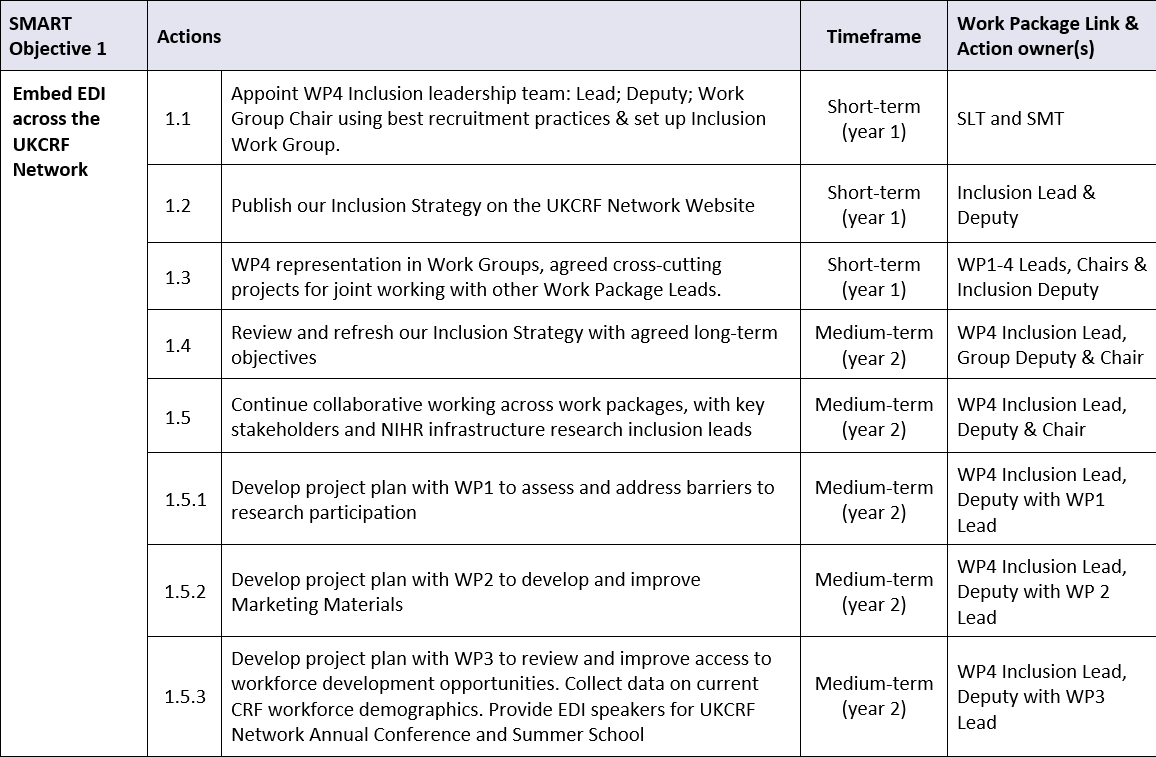
SMART Objective 2: Build capacity, capability and confidence in CRF EDI leads
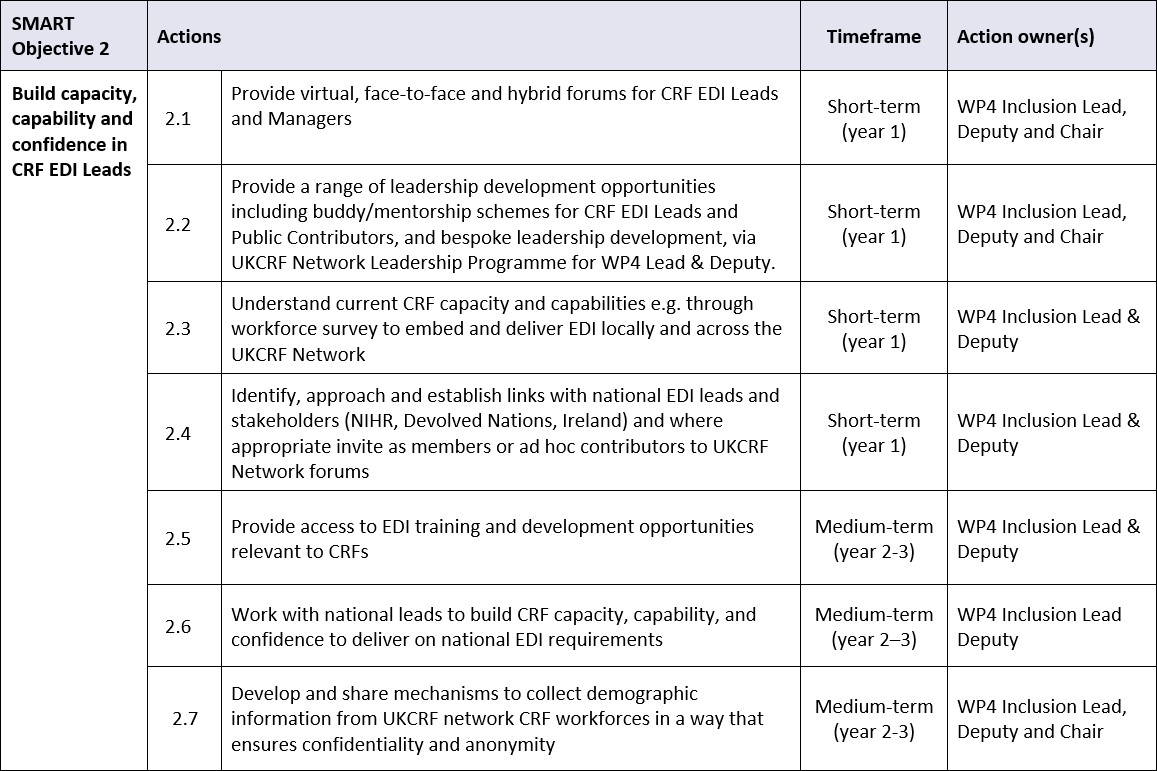
SMART Objective 3: Identify and address barriers to research participation
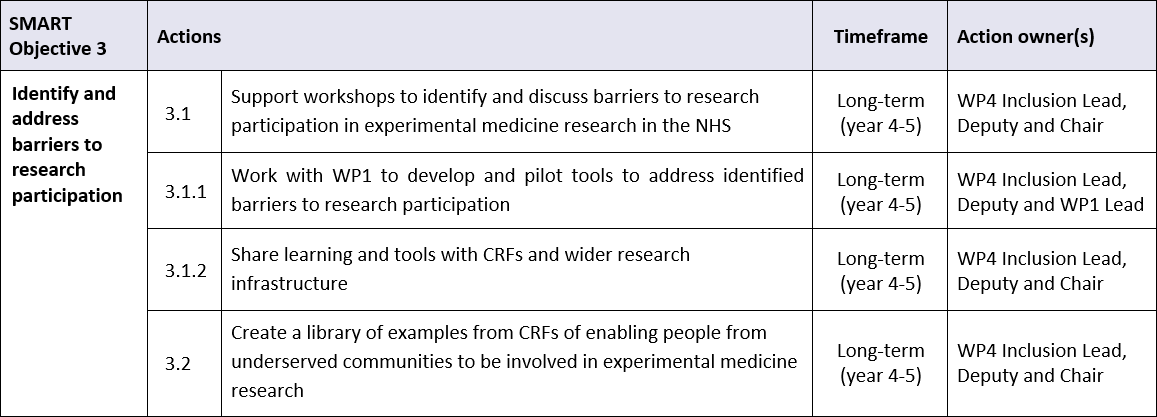
Acknowledgements
We would like to thank those who have contributed to this strategy:
- UKCRF Network public contributors for their valuable insights to producing this document.
- CRF Managers and PPIE Leads for completing the EDI priorities survey.
- UKCRF Network Senior Leadership Team.
- UKCRF Network Senior Management Team.
- NIHR research inclusion Team, who provided advice along the way.
Contacts
To find out more about equality, diversity and inclusion at the UKCRF Network, please email:
[email protected] or [email protected].



